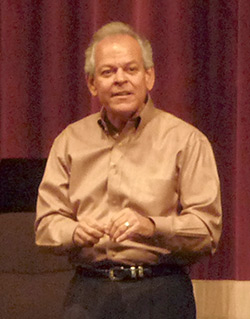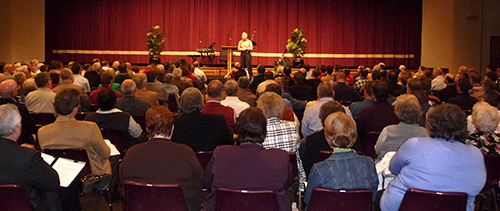It is wrong for pastors to want in others what they don’t want in themselves.
 SBC president Johnny Hunt
SBC president Johnny HuntThat was one of the many “one-liners” used by Southern Baptist Convention president Johnny Hunt, pastor of First Baptist Church, Woodstock, Ga., as he spoke to more than 425 South Carolina pastors and leaders at White Oak Conference Center on March 24.
“It is wrong for pastors to want people to be growing spiritually, but then don’t want to take the steps to grow spiritually themselves,” he said.
“A Day of Encouragement with Johnny Hunt” was an EKL Premier Learning Event of the South Carolina Baptist Convention. Hunt spoke first on ministry passion, developing a “whatever it takes” attitude toward ministry. Following lunch, he challenged leaders around a broad topic of insecurity and confidence. The audience included pastors and local church staff, directors of mission, SCBC institutional leaders, and SCBC staff. Hunt, who said he has a passion for leaders under the age of 40, asked for a show of hands among younger leaders and seemed pleased at the response.
Drawing on his own faith story, his pastorates, and the success of his church, Hunt dotted his presentations with “one-liners” that served as encouragement, challenges, and opportunities for reflection:
– Speaking to the need for pastors to be the same person away from church, he said, “If you are not a good Christian at home, you are not a good Christian anywhere.”
– Reiterating a relational theme throughout the day, he said, “You can touch a community only if you care about people.”
– On the issue of sacrificing to improve the lives of others, he said, “You will never miss anything that you give away.”
– Several times he focused on a pastor’s need to trust and love the church and its staff, saying, “Believe in the people and the staff that you lead.”
– He challenged pastors to have a full life and to enjoy life beyond the church. “A pastor’s focus is far too narrow; a pastor’s life must be about more than the church.”
– Tired of hearing excuses among pastors, he spoke on the need for ministry passion, saying, “Passion has a way of eliminating excuses.”
Several times during the day, Hunt mentioned his recent prostate cancer diagnosis, surgery and recovery. Returning from lunch, he announced that his doctor had just sent word that his most recent prostate-specific antigen (PSA) test came back as zero. He said that through the prostate cancer experience he had been able to invite his doctor to church and expected to see him at Easter services.
“Everything that touches us is filtered through God’s grace,” Hunt said. “God went to extremes to send his Son and redeem us. Isn’t it just like God to use the extremes in our lives to communicate about Jesus? I am looking forward to seeing my doctor at our church on Easter.”
Sam Catoe, pastor of Park Street Baptist Church, Columbia, said the day inspired him to make two changes in his approach to ministry. “I am transferring from the general officers (a category in Sunday school) and joining and engaging a Sunday school class,” Catoe said, referring to Hunt’s statement that he was a Sunday school member and attended when he was not preaching.
“Although I’ve been engaged in sharing my faith, it’s lacked intentionality,” Catoe said. “I have not led the members of the church to emulate me because I haven’t been doing anything to emulate. I’m rearranging my schedule to begin intentionally meeting folks in the neighborhoods around the church and where I live so I can share my faith with them. The church will have a pastor to emulate.”

While speaking on two separate topics – passion and leadership insecurities – Hunt regularly weaved the two topics together, encouraging pastors to be passionate about people and ministry, and challenging them to put aside jealousy and control issues that hold them back.
“So many leaders begin a new work with passion,” he said. “but then passion often gives way to apathy, and we lose purpose. The church and its people then get passive instead of passionate. Passion is an unstoppable force that doesn’t recognize barriers. Pastors must have a daily passion for God, for others, and for ministry.”
Quinn Hooks, pastor of Evergreen Baptist Church, Effingham, said, “I found (Hunt’s) passion inspiring. His love for pastors is evident in his teaching and preaching. This event was well worth the time and effort. The insights into insecure leaders, as well as one’s own leadership insecurities, are priceless.”
Speaking specifically about leadership and insecurity among pastors, Hunt said:
– A focused leader delegates his weaknesses to others and knows how much he can handle.
– If you really want to do something, you will find a way; if you don’t want to find a way, you will find an excuse. The only person believing an excuse is the one giving it.
– When a leader loves Jesus properly, he will love others more deeply.
– Insecure leaders will never call a staff member better than themselves.
– Leaders have faults; tell others when you mess up.
– Whatever baggage the leader carries will get heavier as an organization grows. Insecurity makes the leader unsure, indecisive, creates poor morale, stymies productivity, and affects the organization.
– Leaders cannot have control issues in the church. Needing to be in control of the church removes the church from Jesus.
– A Christian [leader] never has the luxury of being unkind.
– A person will never be a leader if he fears people and the reactions of people.
– An insecure leader is jealous and must remind people that he is the pastor. Anyone who must tell people who he is, isn’t.
– Sadly, many leaders have incredible people to help them, but are too threatened by them.
– An insecure leader doesn’t want his staff around other leaders.
– An insecure leader is often a micromanager or a control freak, desiring such a tight reign because he wants the ultimate credit for everything.
– Secure leaders empower and appreciate others.
– Secure leaders allow their people to “go for it.”
“If you find your identity in anything other than Jesus Christ, you are in trouble,” Hunt said. “Die daily. Allow God to daily change you. Praise those around you and allow others to get the credit for the great things God is doing. Have time for people.”
Mike O’Dell, director of missions for York Baptist Association, said, “I enjoyed seeing Johnny up close and personal. He is a genuine person with a genuine heart for people and the kingdom of God. I thought his lessons were insightful and powerful.” – SCBC
